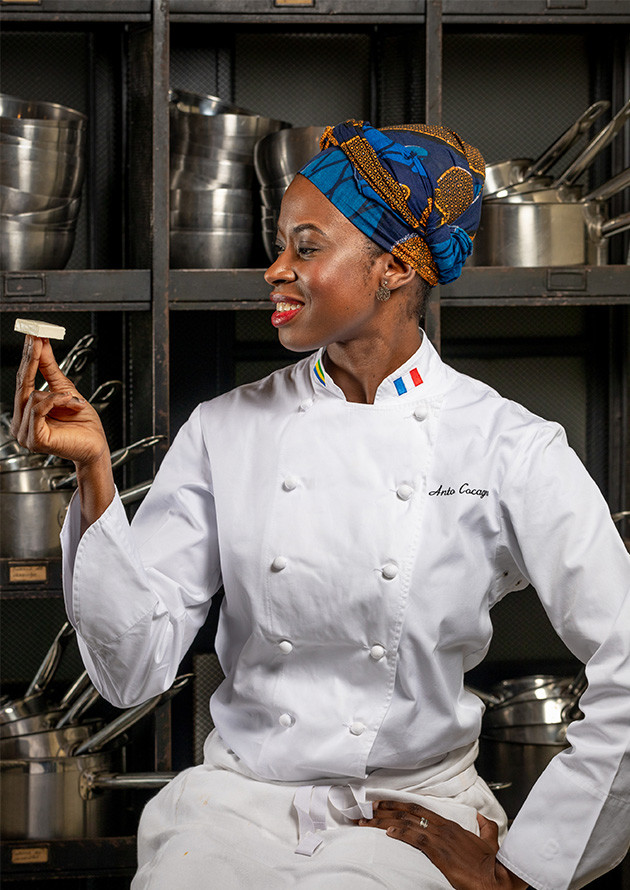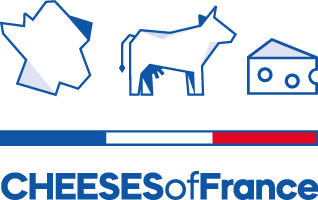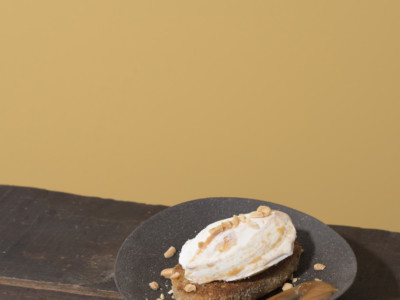Officially, her name is Antompindi Cocagne; but to everyone who knows her, this thirty-year-old mother of a 4-year old son is simply Chef Anto. Anto was born in France and brought up in Gabon, the eldest daughter of an engineer and a nutritionist. After passing her Baccalaureate (in Economics and Social Services), she persuaded her parents to let her return to France to study cookery. She graduated from the Ferrandi school in Paris and found work as a private chef, cooking for individuals, organisations and businesses; she also hosts cookery programmes for Canal+ Afrique.
 Gabon
Gabon

When I was 9, my mother told me that I’d be the one to replace her when she was no longer around. So I learned to cook very early on, in the kitchen with my grandmother, my aunts and my cousins. I always loved that environment. We’d gossip and sing, and the mothers would hand down advice to their daughters – not just cooking tips, but about life in general, especially married life. That’s when I decided to become a chef. I knew it would be fun.
I’ve always had a healthy appetite. My mother used to wonder how I stayed so slim; she’d ask me where I put it all! Mostly, I was curious to understand why we cooked food the way we did, and wanted to learn about combining different flavours. My favourite dish at the time – actually, it’s still my favourite – was wild boar with dika. Dika is the kernel of the wild mango tree, which we roast and grind into a sauce. In France they call it ‘native chocolate’ because it looks and smells like chocolate, although the flavour is totally different. It’s perfect with full-flavoured meat like game.
France is the natural place to learn to cook – it’s the only place to go. My parents saw cooking as more of a maid’s job, but I promised them I’d make them proud, and I couldn’t let them down. It was very hard at first. It was cold, it was a completely different culture, and I’d left my roots behind. And the food was different too – there was no little pot of chilli on the table in the college refectory! I was the only black African at college and on my work placements. But I kept going, thanks mainly to my teachers and mentors;
I’m thinking particularly of Eric Pras, a 3-star Michelin chef, now at Maison Lameloise, in Bourgogne.
My cooking is Pan-African, but not fusion. My ingredients are all African, but I cook and present them in a gastronomic style. My aim is to take people on a journey around Africa – to reveal its treasures to those who’ve never been, and to remind those who already know it what they’ve left behind.
We don’t make cheese in Gabon. The only cheeses I knew from home were those little cubes of cream cheese spread, and pasteurised Camembert. And as a rule, we’re not particularly big on desserts either; we mostly eat fruit. If there are pastries, you know you’re celebrating something very special. So to create a dessert made with cheese was really two challenges in one! I thought I’d use that good old cream cheese spread, and combine it with some typically African ingredients – baobab powder with its milky texture and tart flavour is particularly good with dairy products. I made it into a cream to serve with Pain Perdu (a sort of French Toast) soaked in a mixture of eggs, sugar and condensed milk – a Gabon classic which I then coated and cooked in Mbouraké, which is a mixture of breadcrumbs, peanut butter and milk. Every Gabonese child’s favourite treat!
www.lechefanto.com
+33 (0)6 22 08 53 32
 繁體中文
繁體中文  简体中文
简体中文  한국어
한국어  Français
Français 

